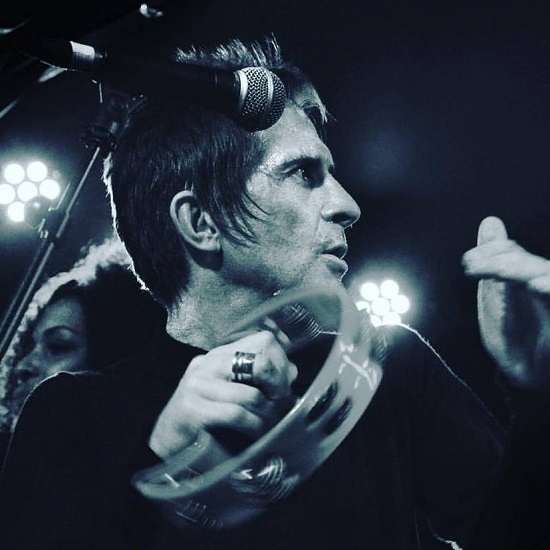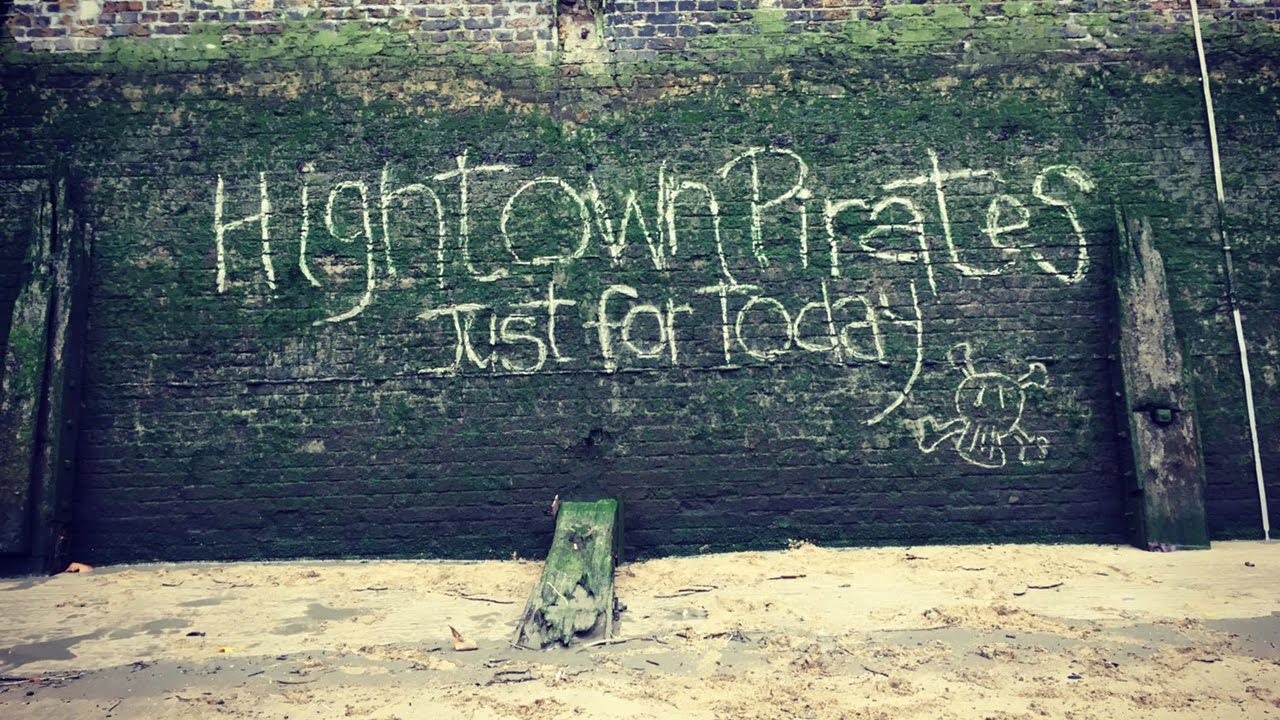Photo by Albert Jagger
Simon Mason’s reputation precedes him as a man who was formerly one of the most notorious drug dealers in the music industry. Now in recovery, and helping other creatives to make the same step, his formerly doomed, heroin-infused attempts to form a band of his own have finally come to fruition with The Hightown Pirates, whose debut album Dry And High arrives on Strike Back Records at the end of May.
In his memoir Too High, Too Far, Too Soon, released in 2013, he detailed his experiences in stark, striking detail, both the giddy highs of Britpop and the 90s and the horrors or subsequent addiction, homelessness and recovery.
That book, hilarious, tragic, nostalgic and hopeful all in equal measure, was the inspiration for many to seek help themselves, and the catalyst too for Mason to prove himself as a musician. His new album is a result of favours pulled in from those inspired by his post-sobriety work, and by a generous helping of simple serendipity.
tQ caught up with Mason in an East London cafe where he’s already waiting, observing the street’s addicts and remembering his former life. Below he takes us through the tale behind the latest stage of his most remarkable of recoveries.
You say you’ve been watching addicts on the street waiting for me to arrive, how does that make you feel now you’re in recovery?
When I see people scuttling up and down just trying to get ten quid together, I just feel really sad, because right now they’re not in the process of recovery. I don’t know any happy endings. I was at a funeral on Friday of someone who’d been clean for years but the damage that they did in their 25 years caught up with them eventually. I think the late 80s and 90s were unprecedented. If you talk to people who were around in the 60s they’ll say ‘we weren’t all stinking of patchouli and wandering up the road,’ it didn’t scoop up so many people like it did in the 80s and 90s.
Did writing a memoir about your experiences feel like therapy?
No. I’ve sat in 12 step self-help groups for donkey’s years and I’ve had therapy coming up to my ears in rehab. I was working in formal drug treatment for about five years, but I found that my experience was that I wasn’t really helping anyone in there, I was a glorified drug dealer because I’m writing people’s prescriptions for methadone. But I have learnt over the years that one of the most therapeutic processes someone in recovery can do is to try and help other people. That book did change my life.
In what way?
The book came out, it sold 5,000 copies, I didn’t see a penny but what started to happen was people would get hold of me to say ‘you’ve helped’. I got this amazing email from somebody that said ‘you don’t know me, I’m just this mom from New York and my daughter was infatuated with a musician and was using heroin. She got the book, finished it, asked for help and has gone into treatment. She’s a year clean.’ It wasn’t so much the process of writing it that turned out to be cathartic or therapeutic, it’s what happened afterwards, I started to get unsolicited emails and messages on social media from people who said ‘you’ve nailed it, you’ve given me some hope.’
You were infamous in the 80s and 90s as one of the most notorious drug dealers in music. Do you feel ‘known’ for the ‘right reasons’ now?
I’m not a perfect human being, I don’t want to be the poster boy of recovery, but most people who are in recovery need to remain anonymous about it; they can’t go to the bank for a loan if they tell them they used to be a crack addict. Because I’ve written a book I’m in a position that I can be ‘out’ about it, and all some people need sometimes is a bit of hope. The strange thing with a lot of people caught up in addiction, myself included, is that you somehow think your life would be boring if you didn’t take drugs. I used to think my life would be boring when sitting outside a kebab shop in Stoke Newington on heroin.
While I don’t feel obligated, I think the new album will hopefully inspire people too. The thing about musicians dealing with addiction is that they believe the source of their creativity stems from staying up for three days on drugs, and you can’t deny that that has been the case, but in my opinion there’s a very finite timeline. The Rolling Stones had five brilliant albums before things started to get messy, and they haven’t written a good one since.
How did being ‘out’ about your recovery develop into finally getting an album out with the Hightown Pirates?
We turned the book into a play, a one man show that ran on the West End, theatres, treatment centres and institutions and as a result of that I got asked to go to Liverpool to interview Mick Head [The Pale Fountains, Shack]. Things could have been better with Mick, let’s put it that way. It started to become a regular thing, I’d go up, we’d watch the Liverpool match and hang out. Then the summer before last he called me up and said ‘I need to get out of Liverpool for a bit, can I come round yours? I wanna stop drinking.’
Before he left I said ‘you need to do the thing you’ve been put on this planet to do, you need to play a gig, and you need to do it sober.’ He’s never, ever played sober since the Pale Fountains, but I said ‘you have to do it just once to know that you can do it’. We did a little gig in a church in Stoke Newington and it was unreal, but his deal for doing it was that I had to open the show for him.
How long had it been since you were last on stage? And what was the next step?
Not since recovery, and it was just me! It was absolutely terrifying! After that though I started playing guitar again and felt like I should have done it ages ago. I dug into my hard drive of songs and found some old demos, I thought they were great, and then a few months later I was I was asked to become part of The Libertines’ crew, to be a sober dude, which is as good an example as poacher to a gamekeeper as you’ll ever find, then I went on the road with Pete Doherty too, reading stuff from my book and playing a few songs. Then later I went on a solo tour and after a gig in Aberdeen someone said ‘you know that song you played? Where can I get it?’
How did you go about getting it recorded?
I was at the Doghouse Studios at Henley on Thames, just hanging around on the lawn while the bands were doing some demos on an iconic English early summer day, with the Thames at the end of the garden. The phone rings and it was this person from Aberdeen who said ‘I’ve been thinking, do you fancy making an album?’ I looked out on the river and I don’t know what caused it but there was this huge ripple just expanding up the Thames. I’m not a hippy, I’m cynical when it comes to that kind of thing, but I thought ‘I need to do it here’. I saw the guy in the studio and I said ‘have you got any availability’, and he said ‘I’ve got two weeks’, and he did me a deal because he’d read my book. I called some friends and it was really weird, it all just fell into place, the drummer John Finnegan had just quit touring with Gang Of Four, the guitarist Dave Aird said ‘my wife’s taking the kids away on their own for those dates’, and the bassist I trialled, who’d toured with Van Morrisson and Adele told me he’d be our engineer too.
When was all the material written?
Some of it when I wrote the book, which I started 20 years ago when I’d started begging. Some of the songs dated to the early 2000s when I was still using drugs and trying to make something happen that was never gonna happen. There was some great stuff in there, some great potential in the demos, and now that I can sing and actually do stuff, why consign them to the bin? The songs that worked picked themselves. Ironically I did a song with Mick Head and that was one of the ones that didn’t! We’ll do it again at some point, it just didn’t have that general effortlessness.
Throughout your life you’ve some intense experiences to draw on as a creative, are there any times you look back on with the most fondness?
I would say, hand on heart, last summer in that studio, where I had my daughter, my girlfriend, my best mates and I’m making an album. I just remembered seeing everyone laughing, we’d worked hard, it was summer, I just felt content.
But do you ever draw on the fun side of the hedonism of the 90s?
There were moments like at Glastonbury ’94, watching Paul Weller from the side of the stage as the sun went down, everyone off their tits on really good pills and feeling like they’d live forever. I can’t pretend that was anything other than an amazing experience. The second track on the album, Perfect Stranger, that’s a house beat, slowed down and with a really distorted guitar. I remember mixing it and thinking ‘we took some really good drugs didn’t we!’
Since I cleaned up my life’s been like yours, really fucking hard. You wonder how you’re going to pay the rent, but I don’t have the luxury of thinking ‘well I’ll just get smashed and forget about it for a bit’, my choice is to live it every waking minute. I don’t miss drinking, I don’t miss drugging.
Does the album have the same message as your book?
As you read through the book it gets very, very dark, before a slow, arduous, tortutous process of trying to sort myself out, to achieve something, to overcome mistakes. I’m 48 years old and this is my debut album. If you’re gonna wait that long, make it a good one, and remember that it’s never too late to have a happy childhood. You don’t have to look or sound a certain way, I think we’re brilliant for all sorts of reasons, not just musically, but because four of us are in recovery and shouldn’t even be alive. If you really believe in something, and other people have let me have a go.



